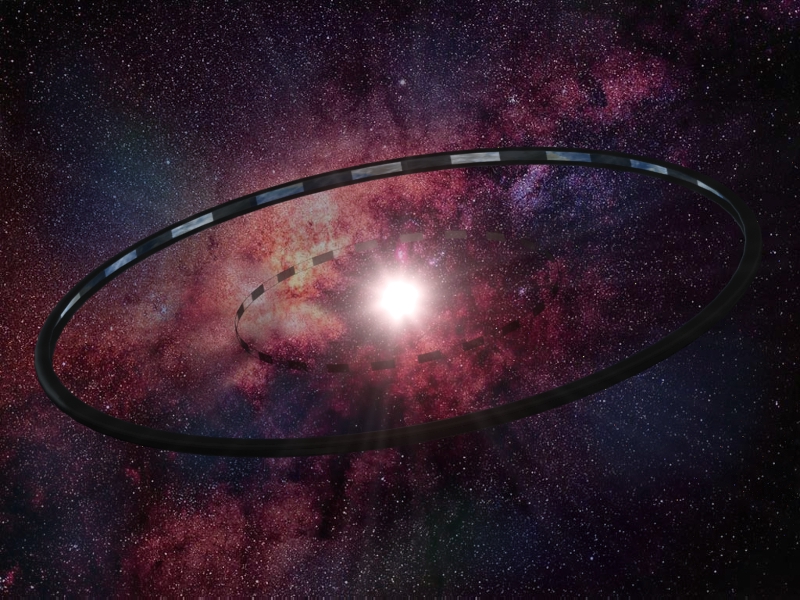A so-called “ringworld” and almost certainly not what’s going on at Tabby’s Star | Image: Hill, CC-BY-SA-3.0, via Wikimedia Commons
This week we’ve got excitement around Tabby’s Star, 3D-printed ovaries in mice, and more news from The Boring Company. It’s the news roundup for Sunday, May 21, 2017!
Tabby’s Star
For the last four years, scientists have been waiting for “Tabby’s Star”—that “alien megastructures” star—to go through one of its odd dimming phases, and the wait is finally over. On Friday it was announced that a 2-3% dip had been observed by the private telescope network that’s been watching the curious star, and the call went out to anyone with telescope time to capture as much data as they could. What they’re looking for specifically are the spectra from the star during the dip in brightness over the next few days. The thing is, we have no idea what’s causing these dips, which seem to be anywhere from 3% to 20%, and spectral data could help. If it’s a massive swarm of comets, or dust, or gases, they’ll absorb different wavelengths. Basically, it could tell us just what’s coming between us and the star. Now, just to be clear, it’s almost certainly not aliens, but whatever it is, it’s something new, and we’re going to learn more about it over the next few days. Expect to learn more about this mysterious star soon! You can read more on the story at space.com, and get the most up-to-the-minute information over at reddit’s /r/KIC8462852 community or following Tabetha Boyajian (the “Tabby” of “Tabby’s Star”) on Twitter.

3D Printed Ovaries
Scientists this week announced the successful proof-of-concept for artificially-constructed ovaries, a technology that could one day lead to certain forms of female infertility in humans. The team at Northwestern managed to 3D-print a collagen scaffolding which was then seeded with the right mixture of cells to grow into a functioning (mouse) ovary. These were then implanted into mice and did seem to work, with three of the nine mice getting pregnant and giving birth to children who themselves grew up to be able to conceive naturally. Now, of course, this is a tiny number of mice, and so we’re years away from human testing, let alone adoption of the technology for use, but it does look as though the technique has promise. If it works it could help women who have gone through chemotherapy at a young age—or had other damage to their reproductive systems—to have children if they eventually want to. You can read more on the story over at Wired.

The Boring Company
Elon Musk’s tunnel-digging venture has raised a lot of eyebrows since the release of a couple of videos detailing its ambitions. Not only does he want to create a tunnel-boring machine that operates at bare-minimum one order of magnitude faster than current models, he also wants it to line the tunnels as it goes, and when the tunnels are done, he wants to put single-car, 200mph “sleds” that take cars wherever you’d like to go. Like this:
And if you think that’s impossible, Musk has news for you. Careful, because the video below could probably trigger a seizure or at the very least make you dizzy, but it’s a working prototype of the “sled” in a tunnel:
The Boring Company, by the way, takes up “2-3%” of Musk’s time, he says. O_o
You can read more over at the Verge and at Wired.
Best of the Rest
And as usual, just because I didn’t write about it doesn’t mean it wasn’t interesting. So here it is, the things I didn’t get to: your weekly linkspam.
- The Wendelstein fusion reactor is working to incredible tolerances
- The Electron rocket is about to launch
- The AR1, a rocket engine to replace the Russian-made RD-180, has passed an important review
- The European Food Safety Authority once again found that Splenda doesn’t cause cancer
- Tesla’s solar roofs will be cheap and have an “infinity warranty,” according to Elon Musk
- The folks who developed the MP3 say its time is over, welcome to the era of the AAC, and
- The Planetary Society is good at explaining things: this time, why the SLS and Orion keep getting delayed.
That’s almost it for today. In parting, I’ll leave you with two trailers, just in case you missed them. One is for the new Star Trek series coming this fall, and the other isn’t. I’ll let you decide which is which.
That’s all for today. Have a great week.
***
Thanks again for reading. Except for the very *very* occasional tip, we only get paid in my own (and your) enthusiasm, so please like This Week In Tomorrow on Facebook, follow us on Twitter @TWITomorrow, and tell your friends about the site!
If you like our posts and want to support our site, please share it with others, on Facebook, Twitter, Reddit — anywhere you think people might want to read what we’ve written. If there’s something you think we’ve missed or a story you’d like to see covered, drop us a line! Thanks so much for reading, and have a great week.
***
Richard Ford Burley is a human, writer, and doctoral candidate at Boston College, as well as Deputy Managing Editor at Ledger, the first academic journal devoted to Bitcoin and other cryptocurrencies. In his spare time he writes about science, skepticism, feminism, and futurism here at This Week In Tomorrow.

